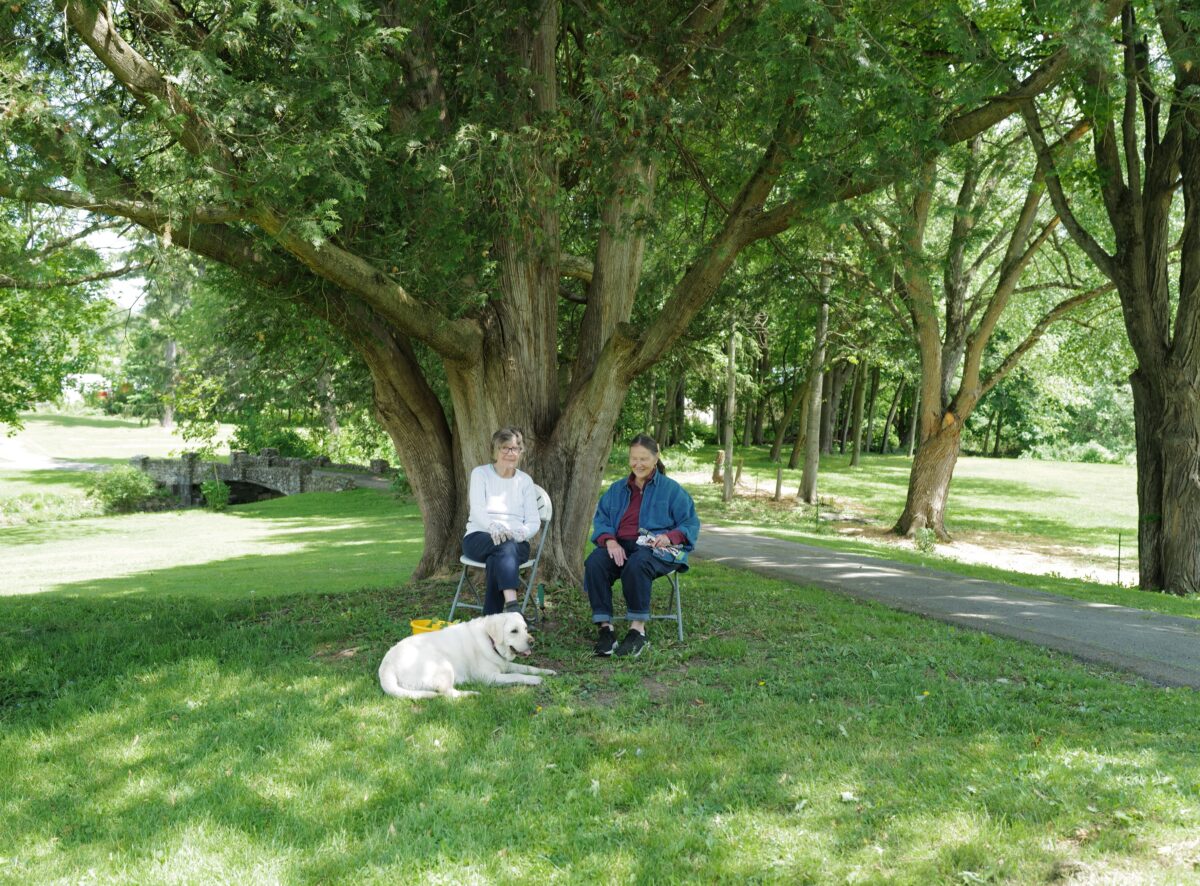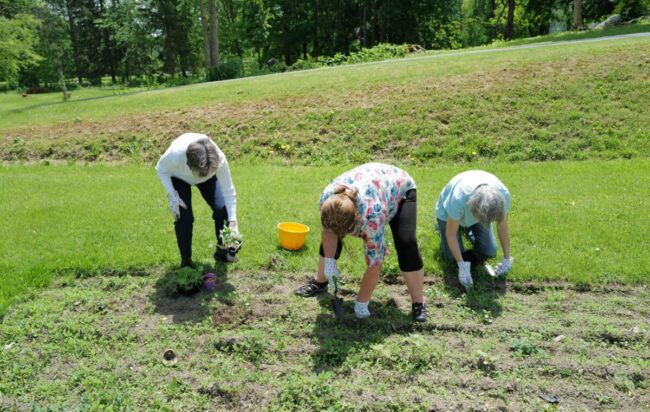The two women in memory care Zinnia and I were visiting in the Mansion garden Thursday and were happy to see us. They loved Zinnia, and she loved them.
Dogs almost always bring up beautiful feelings in Memory Care, and, sometimes, beautiful memories. Dog memories are always good memories. The residents miss their dogs and cats as much as anything. They never seem to forget them.
We talked about dogs, the weather, and the flowers they were helping to plant in the garden.
These two women were not physically able to get down on the ground, so they held back from the planting and watched.
Zinnia and I went on to see some other people working in the garden. But the two were getting restless.
When an aide looked up, they were holding hands and moving, approaching the path that leads into a big park and out to a busy road a quarter of a mile away.
The aide called out to them cheerfully to ask them where they were going. They said they didn’t know. They looked confused.
But then they said they didn’t want to return and tried walking together. Memory patients can get very stubborn.
It was tricky because the aides couldn’t leave the other women alone in the garden until they could get some help. The aides never give orders, they can only ask and persuade.
There was no danger, they couldn’t have gotten far, the aides all have cell phones and walkie-talkies, and the two were noticed instantly. I thought Zinnia and I could help.
I’ve worked with memory care patients for some years and have learned a lot. Communicating with them is most often a joy and a sweet thing.
I called out to Zinnia to come with me and we walked quickly around in a half-circle so I could calmly and efficiently stop in front of them.
“Hi,” I said.
“Hi,” they said, “we are just taking a walk. Can you come with us?”
I said I couldn’t, but I had a favor to ask.
_____
Nothing I’ve done in the past five or six years, from hospice to the refugee children, working with memory patients has touched me in the same way as working with people who have dementia or have lost their memory, the history of their lives.
I’ve had three therapy dogs – Izzy, Red, and Zinnia – and each of them have worked with people coping with memory loss.
Since everyday communication is not always straightforward, we’ve learned to communicate in other, often surprising and beautiful ways. I’ve learned to ask questions and accept the answers, no matter what they are.
When Zinnia and I showed up Thursday, we found several of the residents outside with Paryese, the activity director.
Memory care patients live in locked quarters but the aides make sure they get outside in nice weather, take walks, get exercise and fresh air, and plant things.
The rules surrounding memory care patients are complex and different.
If people in memory care should wander off, as sometimes can happen, the aides are instructed to follow them and ensure they are all right.
They are not permitted to physically or otherwise restrain them.
If they don’t want to come in, they must be followed to ensure they are safe and no harm comes to them. The aides will walk around for hours with them if necessary.
In a worst-case scenario, the police and a family member will be called. Under no circumstances will they be grabbed, pushed, or blocked unless their life is in danger.
____
I’m a volunteer and am not allowed to do more than visit with Zinnia, talk, and play games with the residents. I’m not allowed to care for them.
I can’t and shouldn’t (and don’t) try to make them do anything they don’t wish to do.
But I can talk to them.
“You can do me a big favor,” I said.
“You can be babysitting with Zinnia. She loved sitting with you and I need someone to watch over her for a few minutes.”
For good measure, I added this: “Zinnia misses you, she seems lonely.”
The two beamed.
“Of course,” one said: “that would be wonderful, is she the big white dog?” I said yes, and they turned around and headed for two lawn chairs that the staff had put out for them.
The other nodded her agreement. They loved the idea of babysitting for Zinnia.
They walked back and sat down in their chairs.
And here is the strangely beautiful part of the story: Zinnia walked up without being asked and just laid down in front of them, surprising me.
It was as if she had been listening to the conversation and understood her role.
The two women seemed very happy and pleased to be with a dog and care for her.
I walked away to help the other woman who was confused about what the plants were and what she should do with them.
I turned back and Zinnia, who loves to walk around and sniff things, was absolutely still.
She didn’t move for 15 minutes. Neither did the two women. By then, other aides had arrived, and one went for a walk with the two women. Zinnia just knew.
Each one of them waved goodbye and leaned over and touched Zinnia and got her hand licked.
Then Zinnia got up and came back to the garden with me.
The next day, I brought two raised garden beds to the Mansion garden. Now, the people in Memory Care can’t take care of their flowers while standing up.
I don’t know how it works, but she understood exactly what I was doing and what I was asking her to do. She needed no commands or hand signals or other gestures.
I was uncomfortable at first working with dementia patients. The name is awfully distancing and also has nothing to do with reality.
I’ve met some of the sweetest and most gentle people, often frustrated, sometimes angry. Losing one’s memory is a terrible thing.
But they need to talk and love to talk. I’ve learned never to correct or challenge what they say, just to go along and never give orders. I’ve learned to communicate in a world without memory, but love and goodwill never seem to be forgotten.
And in memory care, I am constantly learning what communicating really is, and how the ability to do it is never lost, even in a world where people seem to be forgetting how to talk to one another.




I always love your posts Jon, but I especially love this one. I helped to take care of my grandmother, as she gradually lost memory. And now, my mother, who is 93, is starting to show signs of memory loss. This post helps *me* to remember not to correct or order mom. It is quite challenging, but so rewarding when I can do this. As time moves along, I hope to improve my skill at just loving her.
She’s lucky to have you Gail
This was profound and deeply moving for me to read, Jon. Thank you for sharing this experience (and I trust you will have more). What a gift not only for you, but for these precious women.
Susan M
What an inspiring and uplifting piece, Jon. My husband’s mother, at 93, is in her last months/weeks/days of her struggle with dementia. She is so tired and confused, but her son is so good at visiting with her several times a week…and her other son, who has always lived at home, is her primary caregiver during these times. It’s heartbreaking to see her as just a shell of the fun-loving, story-telling Scottish lady I grew to love. Dementia is a horrible disease.